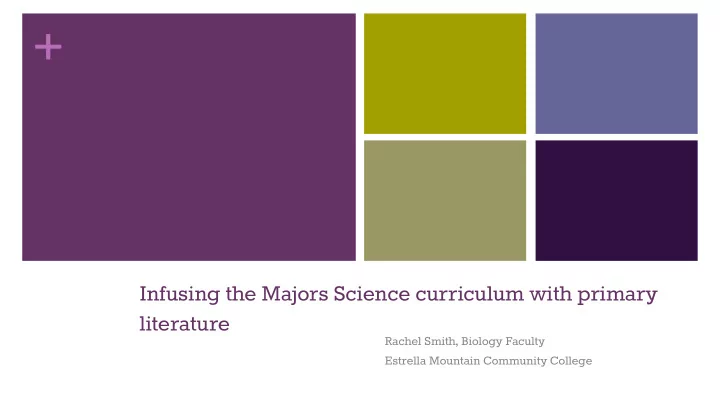

+ Infusing the Majors Science curriculum with primary literature Rachel Smith, Biology Faculty Estrella Mountain Community College
+ Why? Positively impact students in the following ways: ■ Increase content knowledge ■ Increase ability and level of comfort with reading scientific articles ■ Understand the process of science and the lives of the people who do science.
+ What? ■ Inspired by The CREATE method (Sally Hoskins, SUNY) www.teachcreate.org “ … a teaching approach that uses intensive analysis of primary literature to demystify and humanize science for undergraduates. Journal articles – the real currency of science — are used as an inroad to understanding “who does science, how, and why?” “In summary, students read and analyze sets of carefully chosen papers using various approaches (concept mapping, cartooning, visualization and transformation of data) to gain a progressively deeper understanding of the science behind each paper, and, as the sequence of papers progresses, the process of scientific discovery.” ■ Modifications were necessary … .
+ How? Experimental Design ■ I used a pre/post survey instrument that focused on four areas that were relevant to my goals for this project: ■ Understanding ■ Skills ■ Attitudes ■ Integration of Learning ■ This survey instrument is available on SALGSITE (www.salgsite.org) and was developed to assess CREATE-type courses nationwide.
+ Implementation ■ I ran the experiment twice, once in Fall 2015 with one section of BIO182 (24 students) and once in Spring 2016 with one section of BIO182 students (23 students) Regular BIO182 Curriculum PLUS … … Two papers (Fall 2015) … Four papers (Spring 2016) Pre Test Post Test ■ My control group was another BIO182 class, taught by and adjunct, using my same Canvas course shell, without the added papers.
+ Results Box Plot summary of Likert scale responses Likert Scale, 0-6 Fall15post Spring16post Controlpost
+ Data Analysis ■ My data were not normally distributed, so I used the Wilcoxon Rank Sum test to compare pre- and post- average responses for each question on the survey. ■ Highly significant p values for both the experimental cohorts ■ No significant variation in survey responses in the control group
+ Improvements in Likert scores by question group ■ Fall ’15: Likert responses increased by an average of 0.82 points per question. ■ Spring ’16: Likert responses increased by an average of 0.57 points per question Fall ’15 Spring ’16 Control pre vs post pre vs post pre vs post Overall +0.82 (p<0.05) +0.57 (p<0.05) +0.08 Section 1 (Understanding) +0.73 (p<0.05) +0.7 (p<0.05) +0.1 Section 2 (Skills) +1.1 (p<0.05) +0.71 (p<0.05) +0.27 (p<0.05) Section 3 (Attitudes) +0.78 (p=0.06) +0.43 (p<0.05) +0.13 Section 4 (Integration of Learning) +0.6 (p<0.05) +0.3 (p=0.06) -0.38 (p<0.05)
+ Other Data not yet quantified ■ Exam question about author attributions ■ Comments on Exam ■ Long answer questions on Survey
+ Unexpected bonuses ■ As it turned out, the four papers I ended up choosing each fit within their content unit, yet each had a strong evolutionary message (not surprising, really, given the fundamental importance of evolution to Biology). I really liked this unifying thread through the entire 16 weeks. ■ Unit 1 Evolution ■ Unit 2 Animal Diversity, Form and Function ■ Unit 3 Plant Diversity, Form and Function ■ Unit 4 Ecology
+ Unexpected Challenges and Changes ■ Initial plans to not directly teach much content were shelved ■ Number of papers read was greatly reduced from the original proposal ■ I did not measure Biology content knowledge as I had intended to ■ This became a supplemental lab activity to augment the existing BIO182 curriculum. ■ Late addition of a control group
+ Thanks to … .. MCLI ■ My fellow MILRF fellows: ■ Nicola Plowes (MCC), Niccole Cerveny (MCC), Jennifer Lane (GCC), ■ Holly Harper (RSC), Danielle Carlock (SCC) Dr. Bryan Tippett ■ Ilse Kremer ■
Recommend
More recommend